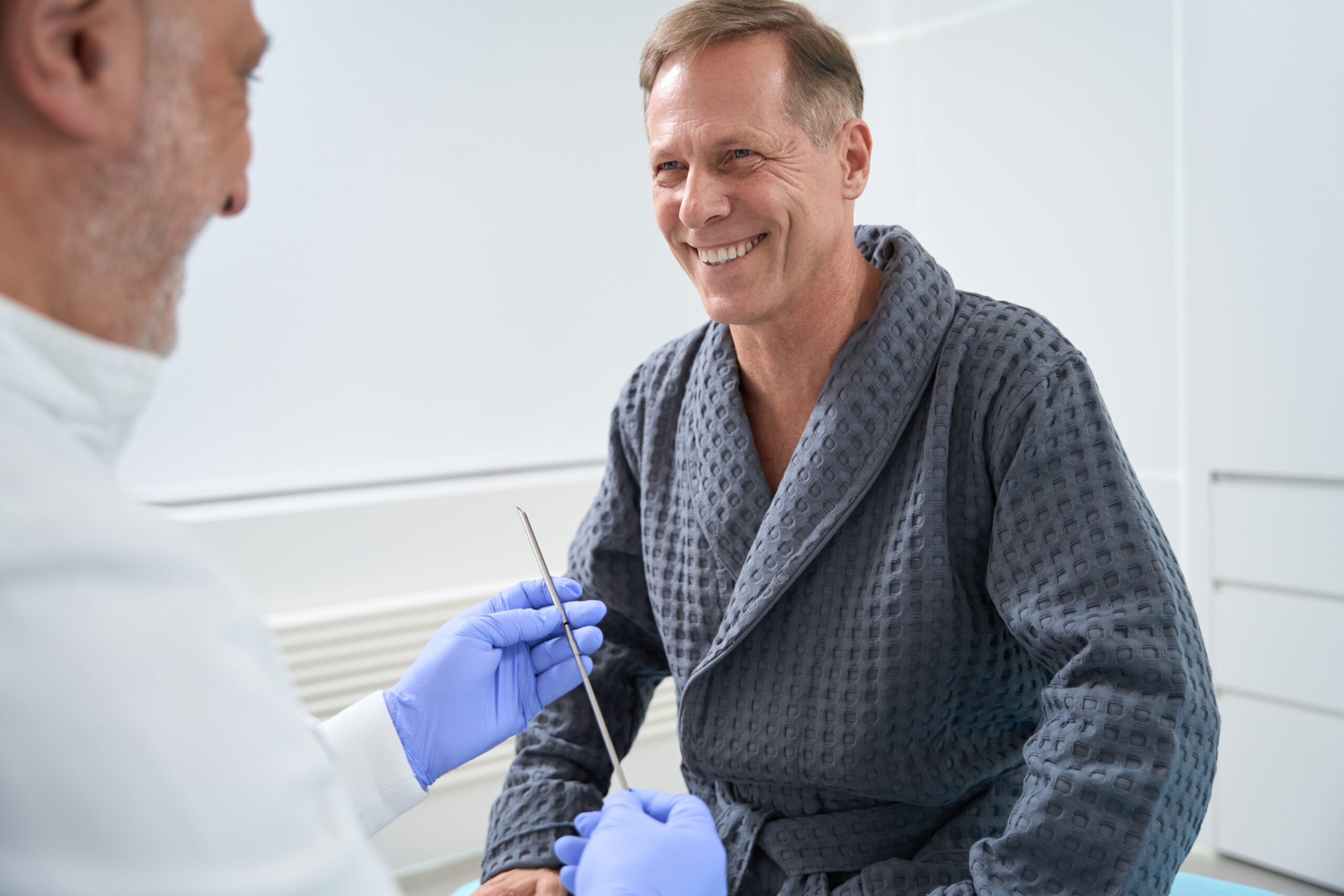Testosterone plays a critical role in male health. Testosterone is the primary male sex hormone, critical for maintaining muscle mass, bone strength, energy levels, red blood cell production, and a healthy sex drive. When testosterone production declines—as it often does with age or due to certain health conditions—the impact on daily life can be significant. When testosterone falls below normal, men may experience a range of symptoms that include low energy and increased fatigue, reduced muscle and bone mass, increased body fat, diminished libido (sex drive) and sexual function, and mood changes like depression or irritability.
Testosterone Replacement Therapy (TRT) – administered via injections, gels, patches, or tiny pellet implants – can restore testosterone to healthier levels and improve many of these symptoms. In fact, for men with clinically low testosterone, TRT has been shown to reverse the effects of deficiency, helping regain vitality and overall well-being.
In this post, we’ll explore the seven proven benefits of TRT, how it works, and why a customized pellet-based approach offers a consistent, long-term solution for many men in Palm Desert and beyond.
What Is Testosterone Replacement Therapy (TRT)?
TRT is a medical treatment that supplements low or fluctuating testosterone levels. There are several forms of testosterone replacement therapy available today, each with unique benefits depending on lifestyle, health history, and personal preference. These include:- Topical gels and creams – applied daily to the skin;
- Intramuscular or subcutaneous injections – typically administered weekly or biweekly;
- Transdermal patches – worn on the skin;
- Oral or buccal tablets – dissolve between the gum and cheek; and
- Pellet implants – inserted under the skin to provide long-term, steady hormone delivery.
The Seven Benefits of TRT for Men
When customized and monitored by experienced professionals, TRT can lead to life-changing results:1. Increased Energy & Stamina
Low testosterone is strongly linked to chronic fatigue, low stamina, and low motivation. This occurs because testosterone helps bone marrow produce the red blood cells that carry oxygen to muscles and organs, which play a role in energy production. In medical literature, low testosterone has been linked with decreased vitality and motivation, which translates to feeling sluggish, easily tired, or just not as energetic. Men undergoing TRT frequently notice more energy and less fatigue during the day. TRT essentially helps “recharge the batteries”. And because pellet therapy releases the hormone steadily, it may help keep energy levels consistently higher without the late-day crashes that sometimes accompany shorter-acting treatments.2. Improved Muscle Mass & Strength
Testosterone is the hormone largely responsible for men’s muscle mass and strength. Low-T leads to a softer physique because insufficient testosterone causes a shift in body composition, often decreasing muscle bulk while increasing body fat. Men with chronically low testosterone may notice that even with consistent exercise, it’s harder to build or maintain muscle and easier to gain weight. Implementing TRT can help reverse these trends. Research shows that when administered appropriately, testosterone therapy can increase lean body mass (muscle) and reduce fat mass, especially when combined with proper diet and exercise.3. Stronger Libido & Sexual Function
One of the most common and distressing symptoms of low testosterone is a reduced sex drive and sexual performance issues. Healthy testosterone levels are essential for a man’s sex drive (libido) and sexual function. Men with low testosterone commonly experience a lowered desire for sex, fewer spontaneous erections, erectile dysfunction, and difficulties with sexual performance. These issues can understandably affect one’s confidence and intimate relationships. Testosterone replacement therapy can often make a dramatic difference in restoring these symptoms.4. Better Mood & Emotional Stability
Testosterone plays a significant role in mood regulation. Testosterone affects the neurotransmitters that influence brain chemistry and mood, so when levels are suboptimal, it’s common to see symptoms like increased irritability, anxiety, depression, lowered cognition, and brain fog. The encouraging news is that testosterone therapy can uplift mood and improve mental well-being for men suffering from low T. In men with hypogonadism (testosterone deficiency), studies have noted improvements in mood, reduced irritability, and a greater sense of well-being once they start. Many men on TRT report a more stable mood, better focus, and a greater sense of well-being.5. Improved Bone Density
Testosterone is a key hormone for bone health by maintaining bone mineral density (the strength and thickness of bones). When testosterone is low, bones can become thinner and more brittle, increasing the risk of osteopenia or osteoporosis (weak bones that fracture more easily). Studies show that restoring testosterone levels in deficient men leads to increases in bone density, particularly in important areas like the spine and hips. In other words, TRT helps load calcium and minerals back into bones, making them sturdier. This can be crucial for preventing fractures as you age.6. Cardiovascular Support
Heart health is another area where testosterone’s role is being actively studied. Houston Methodist suggests that low testosterone is linked with poorer cardiovascular health – for example, men with low T often have higher rates of obesity, insulin resistance, and unfavorable cholesterol levels, all of which are risk factors for heart disease. Low T is even considered by some experts as a possible risk factor in itself for heart problems. By treating low testosterone, men can often improve some of these risk factors. Research has yielded promising findings: in a large study of over 83,000 men in the VA system, those whose testosterone levels were treated back to normal were 24% less likely to have a heart attack and 36% less likely to suffer a stroke compared to those who remained untreated. Testosterone therapy may help by lowering bad cholesterol and reducing fat mass, thereby supporting better cardiovascular function. While ongoing trials continue to monitor long-term cardiac outcomes, most cardiologists agree that keeping testosterone in a healthy range is an important aspect of overall heart health.7. Improved Sleep Quality
Many men are surprised to learn that testosterone levels and sleep quality are closely interconnected. In fact, severe testosterone deficiency sometimes manifests with insomnia-like symptoms. Poor sleep and low T can become a vicious cycle, as adequate sleep is also required for normal testosterone production. By correcting a hormone deficiency, TRT may help break this cycle. When low testosterone is the culprit behind a man’s sleep disturbances, testosterone treatment may improve sleep. Men have reported deeper, more restful sleep after starting TRT, waking up feeling more refreshed. In a clinical study of hypogonadal men who had sleep problems, one year of testosterone therapy significantly improved their sleep disturbances and even enhanced overall quality of life compared to those who remained untreated. It’s important to approach this benefit holistically – TRT is not a stand-alone cure for every sleep disorder (and high doses can sometimes worsen conditions like sleep apnea), but for many men with low T, it can remove one major barrier to sound sleep. By restoring hormonal balance, TRT may help improve sleep quality, which in turn supports mental clarity, immunity, and overall health.Why Choose Pellet Therapy Over Injections?
While intramuscular testosterone injections are commonly used in traditional TRT protocols, they come with several limitations:- Injections must be administered weekly or biweekly.
- Hormone levels tend to spike and crash between doses.
- Injection site discomfort or reactions are common.
- Self-administration can lead to inconsistent results.
- Steady hormone release over several months.
- No weekly injections or daily application routines.
- Consistent results with a simplified experience.
A Personalized, Research-Driven TRT Approach
Any hormone replacement therapy should start with comprehensive lab testing, an in-depth review of your medical history, and a conversation about your lifestyle, symptoms, and goals. This allows practitioners to provide a tailored plan that includes ongoing support and regular monitoring to keep hormones in optimal range. Testosterone replacement therapy, when appropriately prescribed and monitored, can be life-changing for men with low testosterone. From boosting energy and muscle strength to lifting mood and revitalizing sexual health, the benefits of TRT described above help restore a man’s vitality and confidence. Equally important, therapies like bioidentical testosterone pellets make the process convenient and maintain stable hormone levels, so you can enjoy consistent results without the hassle of frequent dosing. As with any medical treatment, it’s essential to work with a knowledgeable healthcare provider. If you are experiencing symptoms of low testosterone, talk with your doctor about your options. When indicated, TRT – especially via a steady-release method like pellet therapy – can help you feel like yourself again, with the clinical backing to give you peace of mind as you reclaim your health.Ready to Feel Like You Again?
If you suspect low testosterone is impacting your life, don’t wait to take action. TRT is a safe, effective, and scientifically supported therapy that can restore vitality and improve quality of life for men of all ages. Whether you’re dealing with fatigue, low libido, poor sleep, or mood changes, we’re here to uncover the root of the issue and help you feel like yourself again—or even better. Vitara Wellness | Palm Desert Backed by clinical research. Tailored to your body. Supported every step of the way. Call today to schedule your consultation and learn more about TRT pellet therapy. Sources:- Mayo Clinic – Testosterone therapy: Potential benefits and risks as you age mayoclinic.orgmayoclinic.org
- Houston Methodist – Dr. Nasir on Low T and Heart Health houstonmethodist.orghoustonmethodist.org
- Healthline – 6 Benefits of Testosterone (citing Journal of Clinical Endocrinology & Metabolism and other studies) healthline.comhealthline.com
- Sleep Foundation – The Link Between Sleep and Testosterone sleepfoundation.org
- Shigehara et al., Aging Male (2018) – Clinical study on TRT and sleep quality pubmed.ncbi.nlm.nih.gov
- Blue Sky MD – TRT Injections vs Pellet Therapy (Medical Director’s perspective)blueskymd.comblueskymd.com
Find your fit
Testosterone Replacement Therapy
Feeling low on energy, drive, or focus? Testosterone Replacement Therapy can help restore balance. Take the first step and book your assessment today.







